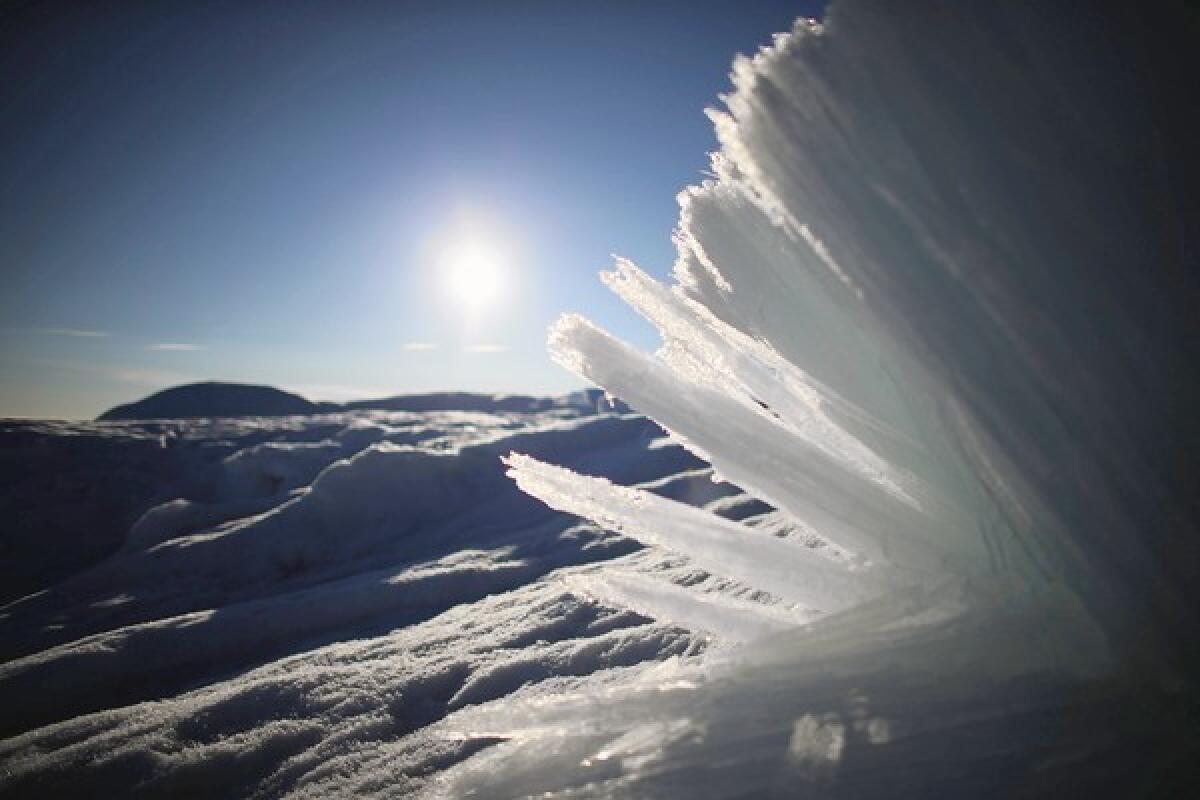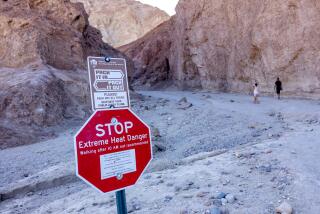2012 one of 10 warmest years on record, report says

WASHINGTON — Last year was one of the 10 hottest since global average temperatures have been recorded, according to an assessment of worldwide climate trends by the National Oceanic and Atmospheric Administration.
“The State of the Climate in 2012,” released Tuesday, paints a sobering portrait of vast swaths of the planet transformed by rising temperatures. Arctic sea ice reached record lows during the summer thaw. In Greenland, about 97% of its ice sheet melted in the summer, far greater than in years past.
Greenhouse gas emissions continued to rise. In early May, the ratio of carbon dioxide in the Earth’s atmosphere surpassed 400 parts per million in an average daily reading at Hawaii’s Mauna Loa Observatory, thought to be the highest concentration in millions of years.
The report is a like “an annual check-up for the planet,” said Kathryn Sullivan, undersecretary of Commerce for oceans and atmosphere and NOAA’s acting administrator. It documents “remarkable changes” in crucial areas like Arctic ice, sea levels and greenhouse gas emissions, she said.
Sullivan said she hoped the report would help businesses, communities, farmers and governments gauge their vulnerability to climate change and better prepare.
“Many of the planning models for infrastructure rely on the future being statistically a lot like the past, and certainly the data should lead one to question if that will be so,” Sullivan said. “Extreme weather events are more frequent and more intense than what we have presumed.”
The NOAA report arrives as climate change contrarians point out that the last 15 years have shown a leveling off of global atmospheric temperatures. But NOAA researchers cautioned against looking at a short time period and at only one indicator.
Over the last 150 years, the annual average global temperature has risen sharply, and is now about 1.8 degrees Fahrenheit hotter than in pre-industrial times, NOAA said. Nine of the 10 hottest years have been recorded since the late 1990s, with 2012 ranking number 8 or 9, depending on the methodology. In January, NOAA reported that 2012 was the hottest year on record for the lower 48 states.
Heat-trapping greenhouse gases emitted by the burning of fossil fuels are the primary cause of higher global temperatures.
The NOAA report underscored the effect that oceans have on temperatures. Oceans store much of the planet’s heat, but ocean heat storage is at near-record levels, the report said, and increases were detected even in the ocean’s depths.
But as oceans trap heat from a warming planet, they change. Surface ocean temperatures in 2012 were among the 11 warmest on record. In a study recently published in the journal Nature and Climate Change, Australian researchers reported that warmer seas have led to profound changes in marine life, including more species moving to the relatively cooler water of the poles.
Sea levels reached a record high in 2012, climbing 1.3 inches per decade since satellite tracking of sea levels began in 1993, NOAA said.
The Arctic also underwent “unprecedented change” and the warming trends there broke several records, the report said. For instance, the sea ice over the Arctic “shrank to its smallest ‘summer minimum’ extent since satellite records began 34 years ago.”
Because the ice caps act as the planet’s “air conditioners,” scientists say, less Arctic ice means less ability to reduce heat.
Even average measurements that indicated normal trends sometimes masked extreme swings in regional weather, NOAA said. For instance, global average rainfall was “unremarkable,” but much of the U.S. experienced extreme drought last year, while the Sahel region of Africa had record rains and flooding during its wet season. This year, nearly 87% of the American West is in drought.
“The latest ‘State of the Climate’ report shows that the Earth continues to heat, the atmosphere is heating, the worldwide ice loss continues, and other symptoms of our warming planet march forward, without cessation,” said John P. Abraham, professor of thermal sciences at the University of St. Thomas in St. Paul, Minn. “A lot of people claim that global warming has magically stopped, but the facts, and the Earth, continue to disagree.”
More to Read
Sign up for Essential California
The most important California stories and recommendations in your inbox every morning.
You may occasionally receive promotional content from the Los Angeles Times.











